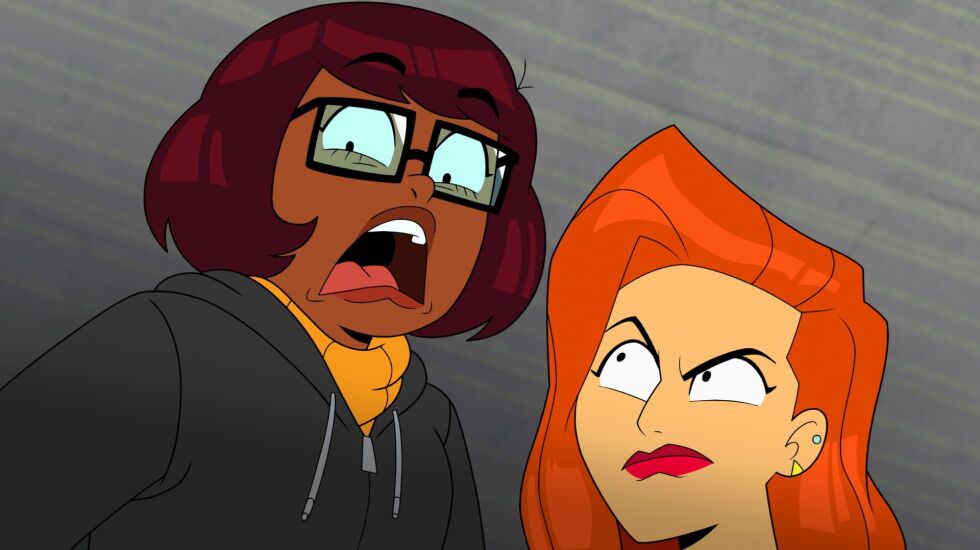
It takes all of two minutes of the pilot episode of the HBO Max animated series “Velma” to make it crystal clear this reimagining of “Scooby Doo” is going to be an adult-oriented and extremely meta take on “the greatest team of spooky mystery solvers ever.” Mindy Kaling’s title character introduces herself by saying:
“My name is Velma Dinkly, and this is my origins story. Sure, normally origins stories are about tall handsome guys struggling with the burden of being handed even more power. And if they are about girls, it’s usually like, ‘Hey, what made this hot chick go crazy?’ ”
Cut to a shower scene, with some mild cartoon nudity, and the following exchange:
“Have you ever noticed how pilot episodes of TV shows always have more gratuitous sex and nudity than the rest of the series?”
“That’s how we learned what Rachel Brosnahan’s boobs look like.”
“And Don Cheadle’s butt.”
A moment later, a dead girl named Brenda falls out of her locker, her brain removed from her skull. “She has no brain!” exclaims Velma. “I’m not dissing her — she has no brain.”
And that’s how it goes for the duration of Season One (eight of the 10 episodes were provided to critics): We’re peppered with a non-stop barrage of pop culture references, social commentary and self-referential asides as we follow Velma and the gang (sans Scooby) in their high school years, before they teamed up and became the franchise that will not go away.
At times the humor is smart and spot-on, but it quickly becomes exhausting. It’s as if a team of very clever scribes gathered in a writers’ room and recorded everything they said — and then shoehorned all of it into the series. Hardly a scene goes by without a character essentially stepping outside the moment to offer some sort of commentary about what’s happening, to wit, this exchange between Velma and her best friend turned frenemy and possible love interest Daphne (voiced by Constance Wu):
Daphne: “According to TV, it’s morally OK to deal drugs if your life is just kind of crappy. Like, your kid’s sick, you’re a widow with a mortgage, you have to live on a lake in Missouri.”
Velma: “Those are all white people, Daphne. Minorities on TV can only deal drugs to escape poverty.”
I mean. Come on.
It also doesn’t help that while Kaling (also an executive producer) lends her usual spark and wit to the performance, the character of Velma comes across as cynical, sour and petty. Even as Velma laments how the “hot girls” at Crystal Cove High School have it made, she’s at least as superficial, self-obsessed and judgmental as they are, which makes it a bit of chore just to stay interested in all the zany and twist-filled goings-on.
As the story begins to unfold, Velma is estranged from her former best friend Daphne, who has taken to selling drugs and hangs around with the other popular and pretty girls. Fred (Glenn Howerton) is an incredibly stupid, wealthy goofball who is desperate to hide his deep secret: that he has yet to reach puberty and has a very small, um, well. As for “Shaggy,” who is voiced by Sam Richardson, at this point he’s known only by his birth name of Norville, and he’s got a big thing for Velma, who only has eyes for Daphne.
So yes, the casting is diverse, and cheers to that. Velma is South Asian and gay, Daphne is an adopted Asian girl with lesbian cop parents, and Norville is Black. (Apparently, some people on the Internet are upset about this retooling of their beloved show that featured a talking great Dane who helps solve crimes. We send our thoughts and prayers to them.)
The cast is terrific; Jane Lynch and Wanda Sykes are particularly good as Daphne’s parents, who are terrible cops. (This leads to Velma quipping, “I thought lesbians were good at solving crimes. It’s like the one positive stereotype perpetuated by cop shows.”) The problem is with the writing, which is so concerned with spitting out one hot pop-culture take after another that the convoluted and increasingly bizarre plots feel secondary to the meta humor. For the record, those plots include: Velma searching for her mother, Daphne hoping to learn the identities of her biological parents, and oh yeah, there’s a serial killer on the loose, eliminating some of the prettiest and most popular girls at Crystal Cove High, and Velma is on the case!
“There is a serial killer in the woods!” Velma proclaims. “Or worse, a celebrity doing a social media cleanse!”
Sigh.







